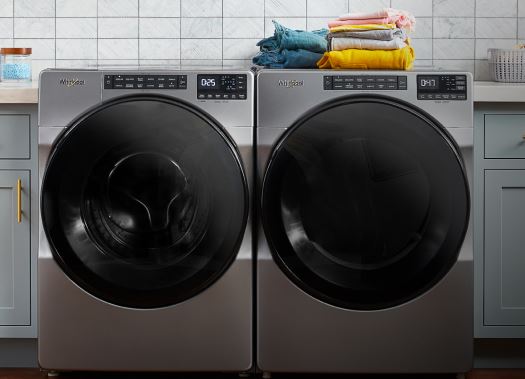You generally want a washing machine that washes faster, uses the least time, and doesn’t make so much noise, and that often depends on its spin speed. So, it’s worth asking, how fast does a washing machine spin?
A standard washing machine spins at 800-1600 RPM (equivalent to 390-810mph, assuming the drum circumference is 30 inches). The spin speed, however, depends on the type of washer, fabric, and detergent, the nature of the laundry, and moisture level.
So, you must consider the five factors when focusing on your washing machine’s spin speed, and I’ll walk you through them. Additionally, I’ll explain the pros and cons of using a high-speed spin and its effect on your laundry.
Remember, the goal is to maximize your washer’s spin potential, not sacrificing your clothes’ lifespan just for a faster wash. So, I’ll also highlight the spin speeds to observe while dealing with different fabrics and clothes.
Let’s dive in!

How Fast Does a Washing Machine Spin in RPM?
We mostly measure a washing machine’s spin speed in revolutions per minute (or RPM), which describes the number of rotations or turns that washer makes every minute. As hinted earlier, a standard washing machine spins at an average speed of 800-1600 RPM.
The higher the RPM value, the bigger the washer drum and the faster it spins. That also means that the faster it turns, the quicker it extracts water from the clothes.
The washing machine’s RPM spin speed depends on these five factors.
1. Washer Type
Top loaders are generally faster than front loaders, so you expect their RPM to vary. On the one hand, a standard top loader spins at a speed of 800-1600 RPM, while its front loader equivalent averages 900-1200 RPM, depending on the model.
2. Fabric Type
Thicker and sturdier fabrics require a higher spin speed than delicate options. That’s because the thicker and sturdier materials can bear the aggression that comes with a high spin and needs it to remove hardened dirt and stains.
If you use a high spin on a delicate fabric, the chances are that you may damage its fabric. That brings us to this question – what spin speed should I use?
Well, here’s a table showing you how to match the various fabrics and clothes with the correct spin speed (assuming it’s a 6Kg washer with a top spin speed of 1400 RPM):
| Fabric or Cloth Type | Spin Speed in RPM |
| Silk | 400 RPM |
| Blouses, shirts, and T-shirts | 600 RPM |
| Delicates | 600 RPM |
| Denim/jeans | 900 RPM |
| Synthetics | 800-1000 RPM |
| Woolen | 1200 RPM |
| Cotton | 1400 RPM |
3. Detergent Type
Heavy detergents (View on Amazon) like Tide and Persil require a much higher spin speed – at least 1000 RPM, unlike lighter detergents, which can work with a 600-700 RPM spin speed.
The reason is that heavy detergents take time to dissolve and act, and a higher spin speed can hasten that. But again, you must consider the fabric type when considering the detergent.
4. Nature of the Laundry
If the clothes are pretty dirty, they’ll require a high spin speed setting, provided they aren’t too delicate. Similarly, expect bulky and oversized items like blankets, duvets, and large towels to require a higher spin speed than the usual clothes.

5. Moisture Level
Ordinarily, the higher the spin speed, the more water the washing machine extracts from the clothes. So, if you want it to extract more water for a shorter drying time, you must step up the spin speed within the acceptable limits.
That brings us to residual moisture percentage, representing how much moisture remains after the spin cycle. Below is a table comparing the various spin speeds and their estimated residual moisture percentage.
| Spin Speed | Residual Moisture Percentage |
| 800 RPM | 70% |
| 1000 RPM | 60% |
| 1200 RPM | 52% |
| 1400 RPM | 50% |
| 1600 RPM | 44% |
| 1800 RPM | 42% |
How Fast Does a Washing Machine Spin Mph?
To determine a washing machine’s speed in mph, we must first convert its RPM value to RPS (revolutions per second), which means dividing the RPM by 60.
After that, we have to multiply the RPS value by the drum circumference to get the speed in mph.
Let’s look at an example below;
Suppose it’s a standard washer with a drum circumference of 30 inches, and we use the average RPM shared earlier of 800-1600RPM;
Then we can calculate the spin speed in mph as follows:
If we divide 600-1600 by 60; we’ll have a speed of 13-27 RPS
And if we multiply the RPS by a drum circumference of 30 inches, the spin speed will be 390-810mph.
So, a standard washing machine spins at 390-810mph, depending on the factors I discussed earlier.
Pros and Cons of a High Spin Washing Machine?
Pros
Generally, running a high spin on your washing machine comes with these advantages:
- Shorter drying time – A high spin hastens the speed at which the washer extracts water from the laundry. The residual moisture percentage reduces in that case, translating to a shorter drying time.
- Energy efficiency – A high spin is fast. Since it translates to a shorter cycle, you don’t have to run the washer for a longer time. That means saving on energy costs.
- Best for larger loads – Washing large loads of clothes at a low spin may take forever. However, the process is more straightforward with a high spin, making a high spin setting the best choice for larger loads.
- Wrinkle prevention – Since the clothes spend the shortest time in the drum, the risk of wrinkling is much lower. That’s unlike a low spin where the clothes spend much time turning on the drum, which only leads to creases.
Cons
Here are the concerns that come with a high spin:
- May damage the fabric – The keyword is ‘may,’ which applies to using a high spin setting on the wrong fabric type. As mentioned earlier, delicate options like blouses, tees, and shirts require a low spin. So, you could damage their fabric if you use a high spin, for example, a setting above 1000 RPM. I’ll share more below.
- May consume more energy – If you run a high spin setting for a long time, you’ll use more energy. So, the only time you save on energy (as shared earlier) is when you run it for a shorter period.
- Noise and vibrations – You can expect your washer to be slightly noisy and even vibrate when spinning at high speed. So, it may not be annoying, especially when washing indoors.

Does High Spin Speed Damage Clothes?
A high spin speed may damage clothes. I’m using the word may because it’s not a certainty. It depends on the type of items you are washing.
For example, we expect you to use a high spin of about 1000-1600 rpm when washing sturdy, thick, and bulky items like blankets, towels, denim, and duvets. However, if you use such a setting on blouses, tees, shirts, baby wear, party dresses, and other delicates, the chances are that you’ll damage the clothes.
Incidentally, the fabric may be caught in the drum as the clothes turn and tear up. The clothes could also tangle and tear up, or components like the sips or buttons may break.
People Also Ask
1. Is 1400 Spin Speed Enough?
1400 rpm is a high spin setting best for thicker fabrics such as cotton and bulky loads such as blankets, comforters, and large towels. Additionally, you can use it to wash large loads of sturdy clothes.
However, if you want to wash delicate stuff like tees, blouses, summer wear, and shirts, 1400 may be too much, and you could damage the fabric. Likewise, you can’t use the speed on denim or jeans as such options require a spin speed of 900 rpm.
2. Is A 1200 Spin Washing Machine Good?
If you plan to wash woolen or cotton fabrics, then a spin speed of 1200 rpm is okay. However, if you intend to wash blouses, tees, shirts, summer dresses, or even denim, 1200 rpm may be too much. You’ll need a spin speed of about 600-900 rpm, depending on the thickness of the fabric.
3. How Fast Does a Front Load Washer Spin?
Depending on the fabric and detergent type, you can expect a standard front load washer to average a spin speed of 900-1200 rpm. If it’s thick fabric or heavy detergent, the spin speed will be much greater than a delicate fabric or light detergent.
Overall, a front load washer spins much slower than a top loader. You can expect a top loader to hit a top speed of 1600 rpm and some up to 1800 rpm.
4. What Is the Fastest Spin Speed for A Washing Machine?
Most standard washing machines, especially top loaders, can hit 1600 revolutions per minute. That translates to 390-810 miles per hour. However, some top-quality options can run up to 1800 revolutions per minute. The speed, nonetheless, suits sturdy, bulky, and thicker items.
5. How Fast Should a Washing Machine Spin?
The standard washing machine should spin at a speed of 800-1600 rpm, depending on the washer, detergent, and fabric type. Expect top loaders to spin at a much higher speed, and consider raising the spin speed when washing thicker and bulky clothes and using heavy detergents like Persil.
6. How Fast Does LG Washer Spins?
Most LG washers spin at a speed of 100-1600 rpm. Some, however, especially the most advanced options, can hit 1800 rpm. The overall spin speed depends on the washer size and capacity, the nature of the clothes, and the detergent.
7. How Can I Make My Washer Spin Faster?
You can do several things to make your washer faster. They include the following:
- Avoid overloading the washer
- Don’t load extra bulky items like blankets and duvets
- Choose a high-spin setting
- Avoid using too much detergent
- Ensure your washer drains correctly
- Tighten the belt enough if it’s loose
- Tighten any loose bolts
In summary, how fast does a washing machine spin?
From our discussion, you can expect a standard washing machine to run at a spin speed of 800-1600 rpm, equivalent to 13-27 revolutions per second or 390-810mph. Nonetheless, factors like washing machine type, detergent type, and fabric type dictate what spin speed to use, as do the moisture level and the nature of the laundry.
Also Read:
- LG Washing Machine Cycles Explained
- Maytag Washing Machine Cycles Explained
- Why GE Washer Won’t Spin Clothes Dry
- Why Whirlpool Washer Won’t Spin Clothes Dry
- Reasons Kenmore Washer Won’t Spin Clothes Dry
- Why Frigidaire Washer Won’t Spin Clothes Dry
- Why Your Electrolux Washer Won’t Spin Clothes Dry
- Reasons a Whirlpool Cabrio Washer Sounds Like Jet Engine
- Are Portable Washing Machines Allowed in Apartments?
